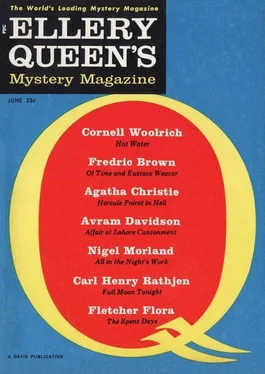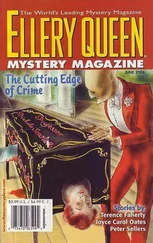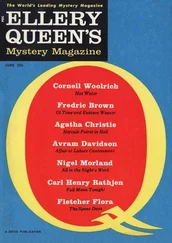Фредерик Браун - Ellery Queen’s Mystery Magazine. Vol. 37, No. 6. Whole No. 211, June 1961
Здесь есть возможность читать онлайн «Фредерик Браун - Ellery Queen’s Mystery Magazine. Vol. 37, No. 6. Whole No. 211, June 1961» весь текст электронной книги совершенно бесплатно (целиком полную версию без сокращений). В некоторых случаях можно слушать аудио, скачать через торрент в формате fb2 и присутствует краткое содержание. Город: New York, Год выпуска: 1961, Издательство: Davis Publications, Жанр: Классический детектив, на английском языке. Описание произведения, (предисловие) а так же отзывы посетителей доступны на портале библиотеки ЛибКат.
- Название:Ellery Queen’s Mystery Magazine. Vol. 37, No. 6. Whole No. 211, June 1961
- Автор:
- Издательство:Davis Publications
- Жанр:
- Год:1961
- Город:New York
- ISBN:нет данных
- Рейтинг книги:5 / 5. Голосов: 1
-
Избранное:Добавить в избранное
- Отзывы:
-
Ваша оценка:
- 100
- 1
- 2
- 3
- 4
- 5
Ellery Queen’s Mystery Magazine. Vol. 37, No. 6. Whole No. 211, June 1961: краткое содержание, описание и аннотация
Предлагаем к чтению аннотацию, описание, краткое содержание или предисловие (зависит от того, что написал сам автор книги «Ellery Queen’s Mystery Magazine. Vol. 37, No. 6. Whole No. 211, June 1961»). Если вы не нашли необходимую информацию о книге — напишите в комментариях, мы постараемся отыскать её.
Ellery Queen’s Mystery Magazine. Vol. 37, No. 6. Whole No. 211, June 1961 — читать онлайн бесплатно полную книгу (весь текст) целиком
Ниже представлен текст книги, разбитый по страницам. Система сохранения места последней прочитанной страницы, позволяет с удобством читать онлайн бесплатно книгу «Ellery Queen’s Mystery Magazine. Vol. 37, No. 6. Whole No. 211, June 1961», без необходимости каждый раз заново искать на чём Вы остановились. Поставьте закладку, и сможете в любой момент перейти на страницу, на которой закончили чтение.
Интервал:
Закладка:
I went cold. In one second I was all but certain of two things. “Gaffer,” I said, trying to sound casual. “What was your wife’s maiden name?”
The Gaffer seemed deep in thought, but he answered, as casually as I’d asked, “Her name? Her name was Leah De Silva. Part British, part Portugee, and part — but who cares about that? Not I. I married her in church, I did.”
“And how,” I asked, “do you pronounce D-e-v-o-r-e?”
The dim eyes wavered. “Worked in the West India Docks, was why we called him the Docker,” said the old man. “But his Christian name, it was Dan’l Deever.”
“Yes,” I said. “Of course it was. And it wasn’t Harry Owen who peached about the whiskey bottle in Dan’l’s gear, so as to get him in the guardhouse — and it wasn’t Harry Owen who sent the note to the wrong young lady — was it? It was someone who knew what Harry would do if he had the chance. Someone who knew that the Docker would certainly kill Harry, if told the right set of lies. And he did, didn’t he? And then the way was all clear and open for you, wasn’t it?”
For just a second there was fear in Gaffer Graham’s face. And there was defiance, too. And triumph. Then, swiftly, all were gone, and only the muddled memories of old age were left.
“It was cold,” he whimpered. “It was bitter cold when they hanged Danny Deever in the morning. There was that young chap from the newspaper, that wrote about it. Funny name ’e ’ad — somethin’ like Kipling — Ruddy Kipling, ’twas.”
“Yes,” I said, “something like that.”
~ ~ ~
Editors’ Note: It has just occurred to us that we have not reread “Danny Deever” for — good Lord, it’s at least thirty years! And perhaps you too have not reread “Danny Deever” for a long time. So here, to refresh your memory, is the full text of Rudyard Kipling’s famous poem — which is so vitally connected with Avram Davidson’s fascinating story...
When we were halfway through our first reading of Mr. Davidson’s story, we found ourselves infuriated. How dare so individual and talented a writer as Avram Davidson send us so blatant an imitation of Kipling? But when we had finished, we figuratively ate our words: the Kiplingesque style, mood, and background are integral, essential, even inspired elements in Mr. Davidson’s story. And how well he has captured the authentic Kipling flavor!
Danny Deever
by Rudyard Kipling
“What are the bugles blowin’ for?” said Files-on-Parade.
“To turn you out, to turn you out,” the Color-Sergeant said.
“What makes you look so white, so white?” said Files-on-Parade.
“I’m dreadin’ what I’ve got to watch,” the Color-Sergeant said.
For they’re hangin’ Danny Deever, you can ’ear the Dead March play,
The regiment’s in ’ollow square — they’re hangin’ him to-day;
They’ve taken of his buttons off an’ cut his stripes away,
An’ they’re hangin’ Danny Deever in the mornin’.
“What makes the rear-rank breathe so ’ard!” said Files-on-Parade.
“It’s bitter cold, it’s bitter cold.” the Color-Sergeant said.
“What makes the front-rank man fall down?” says Files-on-Parade.
“A touch of sun, a touch of sun,” the Color-Sergeant said.
They are hangin’ Danny Deever, they are marchin’ of ’im round,
They ’ave ’alted Danny Deever by ’is coffin on the ground;
An’ ’e’ll swing in ’arf a minute for a sneakin’, shootin’ hound—
О they’re hangin’ Danny Deever in the mornin’!
“ ’Is cot was right-’and cot to mine,” said Files-on-Parade.
“ ’E’s sleepin’ out an’ far to-night,” the Color-Sergeant said.
“I’ve drunk ’is beer a score o’ times,” said Files-on-Parade.
“ ’E’s drinkin’ bitter beer alone,” the Color-Sergeant said.
They are hangin’ Danny Deever, you must mark ’im to ’is place,
For ’c shot a comrade sleepin’ — you must look ’im in the face;
Nine ’undred of ’is county an’ the regiment’s disgrace,
While they’re hangin’ Danny Deever in the mornin’.
“What’s that so black agin the sun?” said Files-on-Parade.
“It’s Danny fightin’ ’ard for life,” the Color-Sergeant said.
“What’s that that whimpers over’ead?” said Files-on-Parade.
“It’s Danny’s soul that’s passin’ now,” the Color-Sergeant said.
For they’re done with Danny Deever, you can ’ear the quickstep play.
The regiment’s in column an’ they’re marchin’ us away;
Ho! the young recruits are shakin’, an’ they’ll want their beer to-day,
After hangin’ Danny Deever in the mornin’.
Fredric Brown
Of Time and Eustace Weaver
When Eustace Weaver invented his time machine he was a very happy man. He knew that he had the world by the tail on a downhill pull, as long as he kept his invention a secret. He could become the richest man in the world, wealthy beyond the dreams of avarice. All he had to do was to take short trips into the future to learn which stocks had gone up and which horses had won races, then come back to the present and buy those stocks or bet on those horses.
The races would come first, of course, because he would need substantial capital to play the market, whereas, at a track, he could start with a two-dollar bet and quickly parlay it into the thousands. Unfortunately, the only tracks operating at the present were in Southern California and Florida, about equidistant and about a hundred dollars’ worth of plane fare away. He didn’t have a fraction of that sum, and it would take him weeks to save that much out of his salary as stock clerk at a supermarket. It would be unbearable to have to wait that long to start getting rich.
Suddenly he remembered the safe at the supermarket where he worked — an afternoon-evening shift from one o’clock until the market closed at nine. There’d be at least a thousand dollars in that safe, and it had a time lock. What could be better than a time machine to beat a time lock?
When he went to work that day he took his invention with him. It was quite compact — he’d designed it to fit into a camera case he already had; so there was no difficulty involved in bringing the time machine into the store, and when he put his coat and hat into his locker, he put the time machine there too.
He worked his shift as usual until a few minutes before closing time. Then he hid behind a pile of canons in the stock room. He fell sure that in the general exodus he wouldn’t be missed, and he wasn’t. Just the same he waited in his hiding place almost a full hour to make sure everyone else had left.
Then he emerged, got his time machine from the locker, and went to the safe. The safe was set to unlock itself automatically in another eleven hours; he set his time machine for just that length of time.
He took a firm grip on the safe’s handle — he’d learned by experiments that anything he wore, carried, or hung onto traveled with him in time — and he pressed the button.
At first he felt no transition, but suddenly he heard the safe’s mechanism click open — and at exactly the same moment he heard gasps and excited voices behind him. He whirled, realizing immediately the mistake he’d made; it was now nine o’clock the next morning and the store’s employees — those on the early shift — were already there, had discovered that the safe was missing, and were standing amazed in a semicircle about the spot where it had stood — when the safe and Eustace Weaver had suddenly appeared.
Luckily he still had the time machine in his hand. Quickly he turned the dial back to zero — which he had calibrated to be the exact moment when he had perfected the invention — and again pressed the button.
Читать дальшеИнтервал:
Закладка:
Похожие книги на «Ellery Queen’s Mystery Magazine. Vol. 37, No. 6. Whole No. 211, June 1961»
Представляем Вашему вниманию похожие книги на «Ellery Queen’s Mystery Magazine. Vol. 37, No. 6. Whole No. 211, June 1961» списком для выбора. Мы отобрали схожую по названию и смыслу литературу в надежде предоставить читателям больше вариантов отыскать новые, интересные, ещё непрочитанные произведения.
Обсуждение, отзывы о книге «Ellery Queen’s Mystery Magazine. Vol. 37, No. 6. Whole No. 211, June 1961» и просто собственные мнения читателей. Оставьте ваши комментарии, напишите, что Вы думаете о произведении, его смысле или главных героях. Укажите что конкретно понравилось, а что нет, и почему Вы так считаете.












